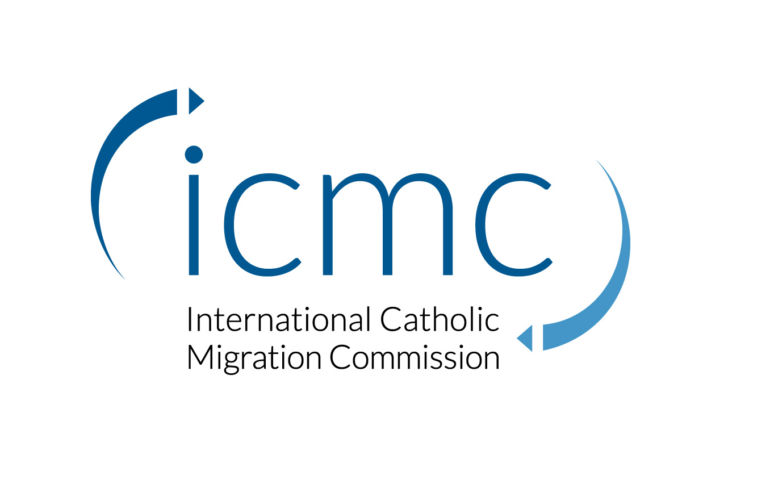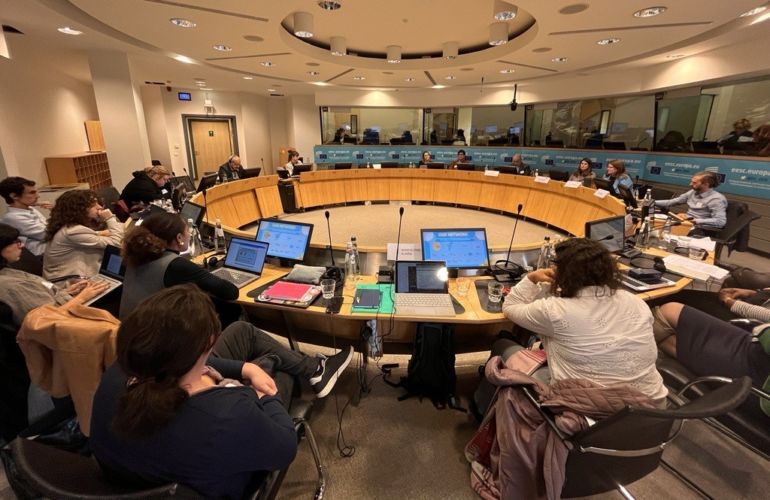Information on Resettlement of Afghan Refugees and Internally Displaced Persons
To all persons seeking information about assistance to Afghan internally displaced persons and refugees:
As an international non-governmental organization deeply committed to serving refugees, migrants, and internally displaced persons in all parts of the world, the International Catholic Migration Commission is deeply concerned about the plight of internally displaced Afghan persons and Afghan refugees who have left the country and are seeking asylum and eventual permanent placement in other countries.
Governments, as well as the United Nations agencies, are developing their specific policies in this regard, and ICMC will provide updated on this page information as it becomes available.
ICMC joins in solidarity with all persons affected by the present humanitarian situation in Afghanistan and pledges its continuing efforts to serve migrants, refugees, and internally displaced persons in need, and to advocate for fair, just, and equitable laws and policies for such persons and families.
For information for former ICMC staff in Afghanistan, click here
For information regarding special U.S. visas for Afghans, click here
For information on Canada’s special programs for Afghans, click here
For information on the U.K.’s special relocation programs for Afghans, click here
For the latest updates on the relocation situation for Afghan nationals to other countries, please visit exitsos.com
If you are living outside of Afghanistan and looking for ways to support Afghan refugees, click here.
TO FORMER ICMC STAFF IN AFGHANISTAN
ICMC is dedicated to supporting its former staff in Afghanistan.
If you worked for an ICMC project funded by the U.S. government, you may be eligible for the special P-2 visas for Afghans. To apply for such visas, you will need a certificate of employment. In order for ICMC to deliver this certificate in a timely matter, please fill out the form you can find here, and email it to afghanistan@icmc.net, along with a copy of your passport or ID and any other documents that might help ICMC determine your employment (work contract, staff badge, etc.).
If you are unable to fill the form, please type the following information in the text of the email: First name, middle, and family name, gender, date of birth, ICMC project you worked on, job title, years when you worked for ICMC, duty station/location, supervisor’s name, current location country, national ID number, national ID place if issuance, passport number, passport place of issuance, mobile phone number, Whatsapp number, email address, and any other reliable way to reach you.
If you worked on an ICMC project in Afghanistan that was funded by the Canadian government, you should contact Immigration, Refugees and Citizenship Canada directly. Learn more here.
If you worked for ICMC in Afghanistan and do not know for which visa you are eligible, please follow the instructions for P-2 visas above.
UNITED STATES
The U.S. government is issuing special immigrant visas for vulnerable Afghans and for Afghans who were employed by the U.S. government, U.S. news agencies, U.S. NGOs and other employees working on U.S.-funded projects in Afghanistan. Please find the links below for more information in several languages below, as well as information regarding general inquiries regarding U.S. efforts to assist at-risk Afghans.
United States – Special Immigrant Visas for Afghans
To learn more about the P-2 visas and other special visas made available by the United States government, visit the Refugee Processing Website, or click on the links below to be directed to a specific section of their website.
U.S. REFUGEE ADMISSIONS PROGRAM INSTRUCTIONS FOR AFGHAN P2
- Information for Afghan Nationals Regarding Priority 2 (P-2) Designation
- Instructions for U.S.-Based Media & U.S.-Based NGOs Afghan P2 Referrals
SPECIAL IMMIGRANT VISA PROGRAM FOR AFGHAN AND IRAQI NATIONALS
- SIV R&P Placement Options
- SIV FAQs 2020 (English)
- SIV FAQs 2017 (Dari)
- SIV FAQs 2017 (Pashto)
- أسئلة تُسأل مكرراً حول ميزات إعادة التوطين للعراقيين و الأفغان المستفيدين من تأشيرة المهاجر الخاصة
- DS-0234 SIV Biodata Form
- 18 Things You Need to Know About Resettlement (English)
- 19 Things you Need to Know About Resettlement (Dari)
- 19 Things You Need to Know About Resettlement (Pashto)
- تسعة عشرة شيئاً أنت بحاجة لمعرفتها حول إعادة التوطين في الولايات المتحدة
- SIV Refugee Benefits Election Form 2021 (English)
ALLIES Act of 2021
Notice: Since 31 August 2021, operations at the U.S. Embassy in Kabul have been suspended.
This program authorizes an additional 8,000 Special Immigrant Visas for Afghan nationals employed by or the behalf of the U.S. Government, or by the International Security Assistance Force (ISAF). Applicants must have been employed for a period of at least one year between October 7, 2001, and December 31, 2023.
There is a five-step application process to be granted a U.S. Visa. This information can be found here, on the U.S. State Department website.
Relevant Documents:
- Chief of Mission (COM) – To be filled out and emailed to AfghanSIVApplications@state.gov
- I-360 – To be filled out and emailed to NSCI360SIVAPP@uscis.dhs.gov . Only after COM approval.
- Online Immigrant Visa Forms – To be filled out and sent to The National Visa Center (NVC) via email at NVCSIV@state.gov
United States – General Inquiries on Afghanistan
This two-page resource produced by USCCB’s Justice for Immigrants presents a summary of concrete pathways to the U.S. for Afghan nationals.
You may find here a link to general inquiries on Afghanistan, including the US refugee admissions program, information regarding assistance by the UN Refugee Agency (UNHCR), information on repatriation for US citizens and permanent residents currently in Afghanistan, and information on how Americans support the US government’s efforts to assistant Afghans.
Clinic offers resources and information regarding Afghan Parolees, which grant individuals stay in the U.S. for a temporary period of time without formal admission. They offer further information regarding repatriation assistance, I-130 petitions, humanitarian parole, and more.
U.S. Citizenship and Immigration Services offers information for Afghans on many fronts, including SIVs, Asylum, filling out I-765 forms, and more.
International Refugee Assistance Program (IRAP)
Another excellent resource for information about the P-2 and other Special Immigrant Visas can be found on the International Refugee Assistance Program (IRAP) website, which you can access by clicking here.
IRAP offers a number of resources:
1) IRAP’s Legal Information website has a number of new or updated guides for pro se applicants and others on the SIV process, including an SIV adjustment guide (new), SIV eligibility overview guide (updated), and SIV letter of recommendation / human resources letter guide (updated). Dari and Pashto translations are available through the options on the website
2) IRAP’s Ask an Expert website. Through this new website, legal practitioners will be able to ask IRAP attorneys questions about their non-IRAP-mentored Special Immigrant Visa cases. The website also features a searchable database of previously-asked questions and answers for easy review.
IRAP attorneys are currently only be answering questions about SIV and US Refugee Admission Program cases. For humanitarian parole and other case types, IRAP encourages attorneys to continue using other resources such as listservs operated by the American Immigration Lawyers Association.
3) IRAP’s Legal Practitioner Resources website has some new resources for practitioners including:
- a revised SIV Practice Guide including a section on SIV-based adjustment of status with a template cover letter;
- revised humanitarian parole application templates for Afghan SIV applicants including a template fee waiver written statement that has been successful with USCIS;
- a flow chart of different immigration options for Afghans;
- an SIV processing flow chart comparing overseas and U.S.-based processing with links to relevant pro se guides.
CANADA
Special Programs for Afghans
Canada has announced the resettlement of up to 20,000 vulnerable Afghan nationals to Canada:
- Canada is implementing a special program for Afghans who assisted Canada. Learn more here.
- Canada also announced a special program for vulnerable Afghans. Learn more here.
UNITED KINDOM
Afghan Relocation and Assistance Policy (ARAP)
- The United Kingdom has announced the Afghan Relocations and Assistance Policy (ARAP) to offer relocation or other assistance to current and former Locally Employed Staff in Afghanistan. Eligible groups include people with existing leave or an open application for student, work, and family visas, journalists, members of civil society groups for human rights, and employees of charities, humanitarian organizations, and NGOs, among others.
- Non-British nationals in Afghanistan who are eligible to apply to the ARAP program, or their families, should call the UK government helpline at +44 (0)2475 389980.
- Learn more about the UK ARAP program.
Resettlement Route For Vulnerable Afghans
- The United Kingdom has also announced a resettlement route for vulnerable Afghans, through which up to 20,000 people could be resettled over the next five years. Details regarding the application process are yet to come.
HOW TO SUPPORT AFGHAN REFUGEES AND THOSE REMAINING IN AFGHANISTAN
From the United States
ICMC’s national member, the U.S. Conference of Catholic Bishops (USCCB), along with the other national resettlement agencies and state and local organizations, is setting up programs to support Afghan refugees who were evacuated to the U.S. Through the following resources, you can find options to support Afghan refugees in your area:
- The USCCB’s Justice for Immigrants Campaign’s includes options to support both Afghan refugees in the U.S. and people who have remained in Afghanistan.
- The Refugee Council USA (RCUSA), of which ICMC is a member, has listed ways in which U.S.-based organizations, businesses, and landlords can support Afghan refugees in the U.S. Initiatives by members of the Refugee Council USA are added regularly.
From Canada
If you are a Canadian citizen or permanent resident and you want to help by sponsoring an Afghan refugee, find out how you can do so here.
UN Refugee Agency (UNHCR) Updates
The UN Refugee Agency (UNHCR) has published updates and its position on returns to Afghanistan.
- View UNHCR’s 16 August key displacement figures
- Read UNHCR’s position on returns to Afghanistan
- Read UNHCR’s information on Relocation Programmes
- Follow UNHCR’s information for new arrivals in Pakistan

